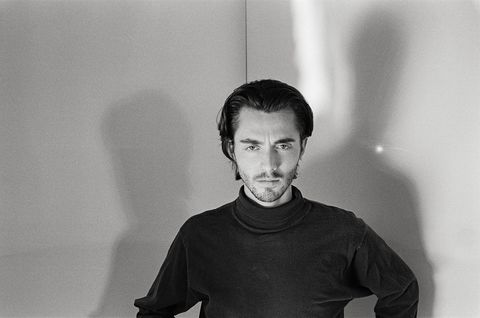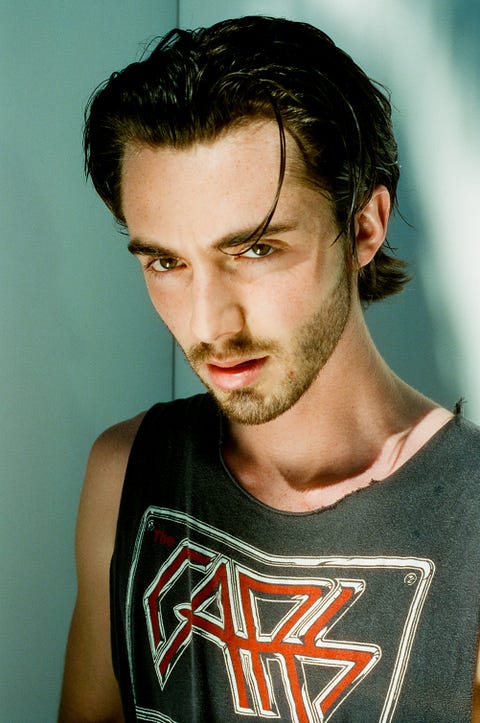Greyson Chance thinks he hasn’t nailed his Cyndi Lauper impression quite yet, but that doesn’t stop him from giving her signature Queens accent a try. “Did you get sued?’” the singer-songwriter says with an almost Snatch Game-worthy attempt. “Then why do you give a fuck?”
The quote is from one of his many conversations with Lauper, who has become a mentor and trusted support system for Chance when he’s at a crossroads. When he came to one earlier this year after wiggling out of his contract with Arista Records at Sony, she helped him pick himself up and refocus on his career. But Lauper isn’t the only famous name connected to Chance. Others that appear in his story include Lady Gaga, whose song “Paparazzi” Chance famously covered in 2010 when he was 12, and Ellen DeGeneres, who propelled Chance to stardom after she saw his Gaga cover. After his first appearance on her show in May 2010, Chance would rack up roughly 20 Ellen appearances.
Twelve years after the kickoff of his career, 24-year-old Chance finally feels like he is making music for himself. His upcoming September album Palladium will mark his first release since his Sony days. He believes it’s his best project yet.
“I wanted to block out all of the noise of thinking about what’s going to work on Spotify, what’s going to work on TikTok, what’s going to work on all these different things,” Chance says. “I really was like, I owe it to myself to go into the studio, and whether or not it be to my detriment, I owe it to myself to really make something that I’m proud of.”
What came was an album where Chance is in control of his own narrative and can examine his fraught past. Because the work started as a self-funded project, Chance didn’t have to worry about selling a catchy hook or curated image. He could now bathe himself in the sound he wanted.
This content is imported from YouTube. You may be able to find the same content in another format, or you may be able to find more information, at their web site.
That’s apparent on the lead single and title track, out today. It’s not exactly formulaic pop music. It’s experimental with an unexpected bridge and almost holy high notes, a clear departure from his last EP Trophies, which sat comfortably in the pop sphere. This is raw. Chance writes about protecting his heart and creative mind, fitting for a track titled “Palladium,” a clear reference to the structure in Greek and Roman mythology believed to protect Troy and later, Rome. Chance’s single serves as a letter to his younger self, one that loved boundary-breaking artists like Elvis and Gaga, urging 12-year-old Greyson to shield his heart.
“I just want to try to protect you like your skin protects your blood / I just want to keep you safe the way the forest keeps her young,” he croons in the chorus. “If I ever let you go, then my whole kingdom’s done.”
It’s unsurprising to find these themes at the heart of Chance’s work. For a moment in his youth, it seemed as if he was primed to be the next Justin Bieber. At his shows, young girls would scream his name, and to this day, his career-starting “Paparazzi” video has roughly 71 million views. Even now, when I mention Chance to my friends, their minds flash back to the boy on Ellen. When one of his thirsty TikToks goes viral (he’s had a couple), he gets a few comments here and there from fans in shock that the boy with the bowl cut is now getting horny on main. In a recent post on the app, he even duetted a video saying the gayest thing he’s ever done is “literally having the entire foundation of my life be based upon an acoustic performance of Lady Gaga’s ‘Paparazzi.’”
So when Chance’s record label dropped him at 15 years old, he was shocked. His entire team was gone, and this three-year ride, which included headlining tours and performances with the likes of Nickelodeon star Miranda Cosgrove, came to a sudden halt. He tried everything to get his feet back on the ground, including calling the woman who gave him his start, Ellen DeGeneres.
“I am very, very grateful to her for giving me my start in my career. I am grateful to myself, when I was 15 years old, when I got dropped by my record label, my management team, my PR team, my agent, I mean, everyone, I’m grateful to myself for picking myself up and finding a next path. And I’m disappointed that she was nowhere to be found when that happened,” Chance says.
After a few years of independently releasing music, Chance turned 18 and decided to stop. “I said I’m done with this, my confidence can’t take it. I think it was a real look in the mirror. I might not be alive in a few more years if I keep on doing this.”
He went to the University of Tulsa and studied history. He didn’t touch a piano for a year. He didn’t sing. He got into the same trouble most freshman in college do. Then, his sophomore year, after attending concerts and, as he puts it, “becoming a fan again,” he began to write music.
Soon, he had an album, portraits, which included spoken word poems, an ode to his mother, and the examination of a failed relationship. He publicly came out during its promotion, and then for the album, he returned to Ellen for an interview and performance. On the show, DeGeneres and Chance discussed his new record and his sexuality, and then he performed his song “shut up.”
For Chance, that day was supposed to be somewhat of a homecoming. The producers and team of the show became his family; one even visited his hometown and met his grandmother during his initial run on the show. For years, the program became his base in Los Angeles, and even though most of his producers had moved on, he thought there was no better place to reintroduce himself than the very talk show that jump-started his career. But things didn’t go as he expected. “That was, that was a really, really tough day,” Chance says. “A lot of people would never know, but I was in tears 10 minutes before having to go on.”
Chance is cagey with the exact details on why, but he does say, “I had one conversation with her [Ellen] that day, and that is the one you saw, that was aired. And that was it.”
Chance was invited to perform once again on DeGeneres’s recent farewell season, but he declined after that last appearance, saying he vowed to never go back onto the show. “It was a bookend moment of this chapter of my life,” he says. “I think people can assume everything that they want, and I’ll tell the honest story at some point, but there’s a reason why I respectfully declined to be on that season.”
So for this new era and this new Chance, it’s clear that while he is looking back, there is no turning back. “I’m a fighter at the end of the day,” he declares. “I’m very proud to just still be here still throwing punches.”
As Chance continues to write music, he also has started dipping his toe into other projects. He filmed an indie movie last summer called The Maybelline Prince, his first major foray into acting. The project, which is currently in post-production, challenged Chance in a new way. While he was used to performing onstage, he had to adapt to perform on the screen.
Chance plays a multidimensional queer man who he describes as a fighter. “He was smart, he was quick witted, he was fashionable, he understood how to get money when he needed it. He was all these other things while being a very, very confident gay man,” Chance says. “He led with his heart, I think more than his identity. That was really, really inspiring to me.”
Since his coming out in 2017, Chance’s identity has been at the center of his work, both in his activism and music. He is an advocate for injustices in society, often lending his voice to the fight for trans rights or abortion rights. During the height of the COVID-19 pandemic, he spent his time distributing vaccines to his community in Oklahoma City. Chance isn’t afraid to lose supporters or followers for supporting what he believes is right. “I’ll never be shy and never shy away from a topic because it’s maybe controversial or is not okay to talk about,” Chance explains.
He takes that approach to his career, too, with his identity at the forefront. He writes about gay sex in his music. On TikTok, he ogles at @bradley.thor, a lumberjack whose muscles bulge as he chops a tree stump. And almost every June, he performs at a smattering of Pride festivals. Even before he publicly came out, many of his songs had common queer themes such as longing, romanticism, and loneliness. I share with Chance that when I listened to his song “Meridians,” long before he posted his rainbow flag on Instagram, I asked a close friend if he was queer. I could feel my young, struggling queer self in his music.
“I’ve always been attracted to really vulnerable songwriting. Whenever I’m listening to music, and when I’m able to feel connected to that person’s world, for you know, for those three minutes and 30 seconds, that’s always interesting to me,” Chance says. “I’m not ever looking for super catchy lines, or things that feel manufactured, I really want honesty and genuineness. And so that’s what I’ve always striven for with my music.”
On his new album, Chance examines this intimacy in a different way. His queerness isn’t at the center, it’s just implied. He doesn’t emphasize a lover’s pronouns or worry over whether his experiences would translate. He just is. His queerness is just another part of the story, another layer.
“That was really freeing for this album because I think it just sort of shows where I am with my own sexuality. I wake up every morning, and I kind of forget about it,” he says. “I think that’s such a growth, that’s such a progress, to just be fully living within yourself.”
For Palladium, he looked at the work of Robert Mapplethrope and gained inspiration from movies. For the first time, he made an album based on visuals instead of sounds. During the process, too, he dared to ask a difficult question: “What do you want in life?”
When I turn the tables and ask Chance that very question, he answers with a smirk. “I’m wanting to do all this now on my own terms. And I’m ready to have some self realizations about what success means to me,” he says. “Sometimes it’s not always having the biggest single and biggest release in the world. The day this album comes out, I will take a deep breath and I will smile because I know that it’s something that I’m immensely proud of. And whether it does well or not, who cares? I’m just excited that I made it.”
This content is created and maintained by a third party, and imported onto this page to help users provide their email addresses. You may be able to find more information about this and similar content at piano.io






